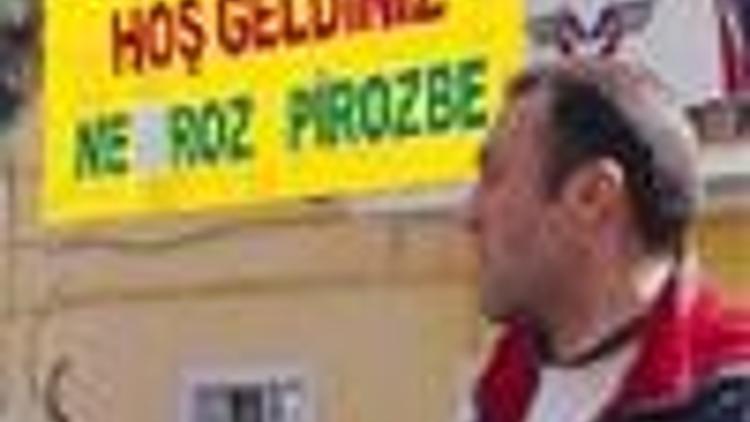Arrival of spring brings battle over the letter ’W’
Güncelleme Tarihi:

Doğan News Agency
Oluşturulma Tarihi: Mart 24, 2009 00:00
ELAZIĞ - The peaceful Nevruz festivities to celebrate the coming of the spring held around the country this weekend could not hide the fact that certain sensitivities have yet to be overcome - mostly obviously, the use of the letter "w."
On Sunday, local police in the eastern city of Elazığ censored a poster hung in the central square because it included the letter "w," referring to Nevruz by the Kurdish spelling "Newroz" in both the Turkish and Kurdish versions of its "Welcome to the Nevruz festival" message. The poster read, "Newroz Bayramına Hoşgeldiniz, Newroz Pirozbe."
The letter "w" appears only in the Kurdish alphabet, not the Turkish one.
Police tried to cover the letters with plastic tape, but the writing remained visible.
Speaking during the festival celebrations, the local head of the pro-Kurdish Democratic Society Party, or DTP, Mehmet Kılıçtepe, said he was the result of Turkey’s assimilation policies, which have left him unable to think in his own mother tongue of Kurdish. So, he said, "I will address you in the language of the brother nation."
Another "w" incident last week had a much more severe outcome, with the local governor’s office in the eastern province of Kars rejecting a DTP petition to hold Nevruz celebrations because the holiday’s name was spelled with a "w."
Turgut Taşkıran, deputy head of the DTP’s Kars branch, criticized the decision, saying, "If the word ’Newroz’ is a crime, then TRT6 [the new Kurdish television channel] and the prime minister’s speech should also be considered a crime."
Taşkıran organized a press conference at party headquarters in Kars, where he said the DTP had applied to the governorship Feb. 24 and written Nevruz in Kurdish, with a "w," leading its application to be rejected. The use of the letters "q," "w" and "x" is against the law in Turkey. "This practice once again shows that some of the laws apply only to us, to Kurdish people," Taşkıran said. "It is known that TRT6 is broadcasting in Kurdish and there are speeches made in Kurdish by leaders of the political parties."
"These examples show that the answer to our application was arbitrary, antidemocratic and exhibited a double standard."
The letter "w" appears only in the Kurdish alphabet, not the Turkish one.
Police tried to cover the letters with plastic tape, but the writing remained visible.
Speaking during the festival celebrations, the local head of the pro-Kurdish Democratic Society Party, or DTP, Mehmet Kılıçtepe, said he was the result of Turkey’s assimilation policies, which have left him unable to think in his own mother tongue of Kurdish. So, he said, "I will address you in the language of the brother nation."
Another "w" incident last week had a much more severe outcome, with the local governor’s office in the eastern province of Kars rejecting a DTP petition to hold Nevruz celebrations because the holiday’s name was spelled with a "w."
Turgut Taşkıran, deputy head of the DTP’s Kars branch, criticized the decision, saying, "If the word ’Newroz’ is a crime, then TRT6 [the new Kurdish television channel] and the prime minister’s speech should also be considered a crime."
Taşkıran organized a press conference at party headquarters in Kars, where he said the DTP had applied to the governorship Feb. 24 and written Nevruz in Kurdish, with a "w," leading its application to be rejected. The use of the letters "q," "w" and "x" is against the law in Turkey. "This practice once again shows that some of the laws apply only to us, to Kurdish people," Taşkıran said. "It is known that TRT6 is broadcasting in Kurdish and there are speeches made in Kurdish by leaders of the political parties."
"These examples show that the answer to our application was arbitrary, antidemocratic and exhibited a double standard."

